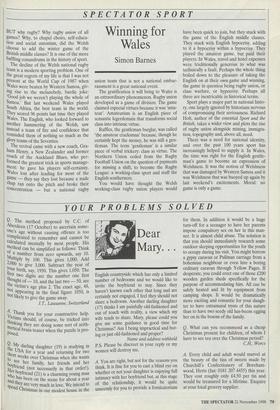SPECTATOR SPORT
Winning for Wales
Simon Barnes
BUT why rugby? Why rugby union of all games? Why, to chapel choirs, self-educa- tion and social unionism, did the Welsh choose to add the winter game of the British middle classes? It is one of the more baffling conundrums in the history of sport. The decline of the Welsh national rugby team is a modern sporting problem. One of the great regrets of my life is that I was not present at the World Cup of 1987 when Wales were beaten by Western Samoa, giv- ing rise to the melancholy, bardic joke: Good job we weren't playing the whole of Samoa.' But last weekend Wales played South Africa, the best team in the world. They scored 96 points last time they played Wales. The English, who looked forward to another hammering of the Welsh, saw instead a team of fire and confidence that reminded them of nothing so much as the glory teams of the Seventies.
The revival came with a new coach, Gra- ham Henry, a New Zealander and former coach of the Auckland Blues, who per- formed the greatest trick in sports manage- ment: he gave his players self-certainty. Wales lost after leading for most of the game — they say they lost because a nude chap ran onto the pitch and broke their concentration — but a national rugby union team that is not a national embar- rassment is a great national event.
The gratification it will bring to Wales is an extraordinary phenomenon. Rugby union developed as a game of division. The game claimed especial virtues because it was 'ama- teur'. Amateurism is an English piece of semantic legerdemain that transforms social class into intrinsic virtue.
Raffles, the gentleman burglar, was called `the amateur cracksman' because, though he certainly kept the money, he was still a gen- tleman. The term 'gentleman' is a similar piece of verbal trickery: class as virtue. The Northern Union ceded from the Rugby Football Union on the question of payments for missing a shift, to become the Rugby League: a working-class sport and stuff the English southerners.
You would have thought the Welsh working-class rugby union players would have been quick to join, but they stuck with the game of the English middle classes. They stuck with English hypocrisy, adding to it a hypocrisy within a hypocrisy. They played the amateur game, but paid their players. In Wales, travel and hotel expenses were traditionally generous to what was technically a fault. Perhaps the whole thing boiled down to the pleasure of taking the English on at their own, game and winning, the game in question being rugby union, or class warfare, or hypocrisy. Perhaps all three are inextricable in historical terms.
Sport plays a major part in national histo- ry, one largely ignored by historians nervous of compromising their seriousness. Richard Holt, author of the essential Sport and the British, takes a wider view and plots the rise of rugby union alongside mining, immigra- tion, topography and, above all, need.
There was a need for national identity, and over the past 100 years sport has increasingly helped to supply it. In Wales, the time was right for the English gentle- man's game to become an expression of Welshness. It was the notion of Welshness that was damaged by Western Samoa and it was Welshness that was buoyed up again by last weekend's excitements. Moral: no game is only a game.


















































































 Previous page
Previous page